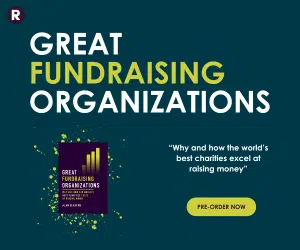A short, succinct guide to the Commission the Donor Experience and its output
If you give a donor a great experience when she supports her charity, she will feel great, will give more, give for longer and be more likely to leave a legacy/bequest.
If you believe this, you shouldn’t build your fundraising strategy around thinking of how to persuade people to give more money to help your charity.
You should start by inspiring the donor to make a difference to the world/individual people’s lives, by giving to your cause, (via but not to your organisation), and feeling good about it.
Advertisement
This is totally different. This is a 90 degree shift in thinking.
What follows was written for a Dutch audience, who have taken up the Commission’s work with enthusiasm.
Finding out about your donors
So, then, you should find ways to discover what motivates your donor, why she supports you rather than one of your competitors? What triggered her first donation? What does SHE want from her relationship with you? What doesn’t she like?
Answering these questions is a long and complex process, and requires serious thought. It will be different for different types of donor. However, it will form the basis of your strategy.
At the same time as you find out about your donors’ motivations, you can start to create your fundraising strategy around the donor and so raise more money for your charity and your beneficiaries. Then you should constantly refine your strategy as you find out more about your donors.
The Commission on the Donor Experience
This is what is behind the Commission on the Donor Experience. A new way of looking at the world. From the eyes of the donor and what motivates her, not the eyes of the organisation and the organisation’s needs.
Look at the 28 project headings, and pick one that interests you. You will then be taken to 10 – 15 sides of the summary, containing all the relevant principles and recommendations.
Stop there, and you will have gained a great deal; perhaps a new way of thinking.
Or, go to the project’s backing document, full of case studies and further thinking.
Or, follow one of the links in the summary to one of the other projects that is directly relevant.
Or, go to the summary of a new project that stimulates you.
The CDE’s outputs are an encyclopaedia, not a novel. Dip in.
Examples?
Reinier asked me for examples. I refuse, because so much depends on whether you are a corporate fundraiser, or raising money from individual givers, or whatever.
If you want the essence of what the Commission’s outputs are about, read the 6Ps at the beginning of the list of summaries. Written by the legendary Ken Burnett, they are an easy read that will tell you how well you are currently doing.
It seems that you, the Dutch, have taken this thinking into your work more quickly than the British. Is this because of The Future of Fundraising movement? Or, Ken’s terrific talks in Amsterdam? See here. I don’t know why. Maybe you are just more open to innovation than we are? (What an awful thing for a Brit to say.)
Examples… please?
Alright, Reinier. One example.
During NSPCC’s Full Stop Appeal, which aimed to put an end to child abuse in all its forms, we had many £1 million donors, many of whom felt as did my example, below.
She is typical, not extremely unusual.
Sally was a self-made millionaire. She had a loving family, being well educated. She lived in a fairy-tale house. She had everything she could wish for.
She gave £1 million pounds. And she spoke at events. She was very clear. What motivated her to drive to work in the morning was the possibility of being able to give even more to the NSPCC’s great cause, and feel great about it.
What is fundraising about?
Going back please to the beginning of this blog.
Is it about persuading people to give to your charity, because the money is so urgently needed?
Or is it about inspiring people to want to make a difference to the world and the lives of individuals, by giving to the cause and feeling great about it?
Which will raise more money? And which is the right thing to do?
If the paragraphs above resonate with you, go to the Commission’s outputs. They are as relevant to you and your donors as to British donors.
If they don’t resonate, don’t. Carry on as you are. But, surely not?
Giles Pegram CBE
Consultant
10.v.2018
© Giles Pegram CBE





